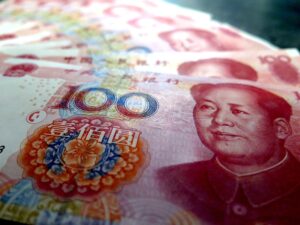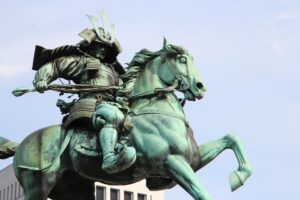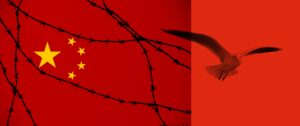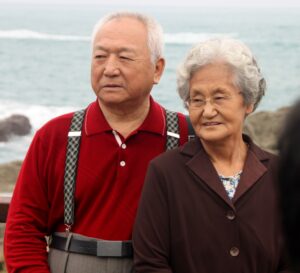The relationship between Chinese foreign and domestic policy.

There is no doubt that Chinese foreign policy has taken a turn last decade with the last months taking it to an extreme. Enacting the National Security Law in Honk Kong and later crashing its democratic opposition, engaging in a military skirmish with India in Himalaya, or crossing the Taiwanese median line with its warplanes are just a few of ever more assertive China’s moves aiming to consolidate its regional power striving for an elevation of its global position. These ever more aggressive actions indicate a departure from the national doctrine of ‘keeping a low profile’ (‘taoguang yanghui’) espoused by Deng Xiaoping and maintained by his successors in response to international isolation of China after the 1989 Tiananmen Square Protests. China’s disengagement from this approach is explained by the government as simply responding to external provocations. However, given that in many cases China is the provocateur, this article identifies other causes behind such a transition.
Hide and Bide disengagement
Many forget that the ‘Hide your capacities, bide your time’ approach was to serve only as a temporary solution to be replaced by more assertive diplomacy in attaining achievement and seeking China’s global role when it was economically ready to confront its adversaries. Keeping a low profile aimed to slowly shape a favourable environment for China’s national rejuvenation by catching up with the West, consolidating power, gaining political support across the common people and elites. The indisputable, gradual decline of western might in relative terms vis-à-vis Asian powers cannot be neglected in understanding Beijing’s doctrinal evolution.
Years immediately following the 2008 financial crisis turned out to be a turning point for China’s international status and its relations with some countries related to East Asia, a territory much of which China officially started to recognize as its rightful territory. In 2010, China’s GDP surpassed Japan’s to rank only behind the United States. The year 2010 also witnessed rising tensions between China and the United States, Japan, the Philippines, and Vietnam. These tensions intensified as Chinese claims and policies became bolder every year. More recently, the far from perfect handlining of Covid by the US and its European allies served as another factor feeding Chinese propaganda and solidifying its claims.

This departure is often associated with the ascend to power by Xi Jinping. Although Xi’s ‘striving for achievement’ doctrine served as a crucial incentive contributing to China’s opening a new era in the international world order, it cannot all be attributed to Xi. It is a fundamental structural, systemic shift in approach and one can identify multiple processes which led to such a transition. The systemic changes were already planted by Xi’s predecessors. Hu Jintao was the first Chinese president to recognize environmental change with weaker Western powers. Whether with Xi behind the wheel or not, China would have no other choice but to take a firmer stance on the international arena. Interestingly, the main determinant defining China’s foreign policy shift is not its leaders or the decline of the US’s might, but its domestic politics. China faces ever more profound challenges in areas such as economy, demographics, and politics at home, and espousing a more assertive foreign affairs strategy was an answer to Beijing.

Economic difficulties
China’s economic pace of growth is slowing down and the Covid pandemic caused its economy to shrink for the first time in twenty-nine years. To comprehend the complexity of the problem, we need to understand that the political mandate of China’s Communist Party relies heavily on the continued economic growth. The support or at least neutrality of the society would quickly dwindle if the country encountered a prolonged economic slowdown. Society’s support guarantees Communist Party’s survival, which has always been the primary aim since 1949. Driven by the fear of losing the grasp of power methods of holding on to it generate substantial expenses each year. China spends more on stability maintenance and policing than on the military. These include the robust network of traditional policing, but also Xinjiang re-education camps, digital surveillance system, etc.

Political struggles
Alongside the Covid-weakened domestic consumer demand, China suffered from the impact of the devastating trade war with the US. What has the potential of turning out equally detrimental to the Chinese Communist Party is the antagonization of the academic, business, and political elites, who press the government for normalization of relations with the US. The common people do not feel that the exacerbation of the relationship with the US will affect their livelihoods, therefore they support Xi’s belligerent foreign politics. However, elites do not take foreign affairs new normal as a good omen fearing further retaliation from the US and the subsequent state funds redistribution. The continuation of the diplomatic tension and the trade war with the US will only further antagonize the elites adding to the reluctance brought by the purgatory anti-corruption campaign, through which core opposition to Xi’s rule was marginalized under the pretext of cleansing the nation of corruption. In the aftermath of this cleansing campaign, which is estimated to have marginalized around 1 million people, Xi managed to eliminate domestic adversaries and consolidate power to an unprecedented degree. Torigian analyses Xi’s foreign policy decision-making in comparison to that of Mao Zedong and Deng Xiaoping, arguing that Xi utilizes formalized decision-making authority, concern among Party elite about political instability, norms of obedience, weak institutions, and other tools to obsessively consolidate power over key decisions. What also enrages the elites and alarms the business community is the state’s ever-increasing role in the economy, which despite the promise for a more efficient and resilient system, did not prevent China’s GDP from falling.
Demographic challenges
The current economic hiccup is further intensified by the path of the demographic structure changes China embarked on leading to an inevitable economic and political challenge in the future. The aging population will put a burden on the government and the workforce. The number of pensioners in China is expected to triple within three decades. By 2050 it is estimated that 90% of the production age workforce will have to support at least one parent and 66% both parents. The pessimistic men to women ratio imbalance, caused by the male heir preference and daughter abortions combined with the one-child policy will lead to up to 15% of men not finding a wife and not fathering children in 2050. The imbalance will in turn lead to the erosion of the Chinese family structure. It serves as a critical factor in understanding domestic challenges China will face in a few decades, which is often overlooked by western experts.

The life cycle and size of a ‘large Chinese family’ consisting of uncles, aunts, first and second cousins undergo a gradual decline as a result of the one-child policy, which prevented an estimated between 400-600 million births. The tribal and clan-like nature of the Chinese family provided the society with connections, capital, information, and confidence necessary to reduce the risk of commercial failure. Such a favourable environment increased the chances of taking high-risk, high-reward business decisions, contributing to China’s impressive nearly 3-decades long GDP growth. The recent relaxation of the one-child policy will slow the abovementioned processes, but will not stop, nor reverse them. This change will be of fundamental importance for the functioning of the Chinese economy. The changing structure of the family, aging population, reduced share of production age workforce, rural areas population moving to cities will have an enormous effect on China’s state funds distribution.
The slowing economy and growing unemployment will translate into rapidly growing social needs. China will require an investment of more significant amounts in social politics to maintain stability. That will impact China’s capability to invest in development and business project and further curb GDP growth.
Conclusion
The main motivation stimulating the aggressive foreign policy is to divert attention away from the increasingly more visible domestic problems resurfacing ever more frequently in the international and Chinese research, academia, and policymaker’s discourse. It is a multi-faceted project aiming to gain popular support by reinstating China’s pride and greatness lost to Western powers during the ‘Age of humility’. China cannot afford to look weak at home. Beijing is compelled to act strongly and decisively abroad. The assertiveness will not fade away. It may go through phases of apparent benevolence, but having in mind China’s domestic challenges and population’s awakened ambitions, Beijing will not be able to return from once espoused strategy.
Jan Kajetan Kayo Wojtynski